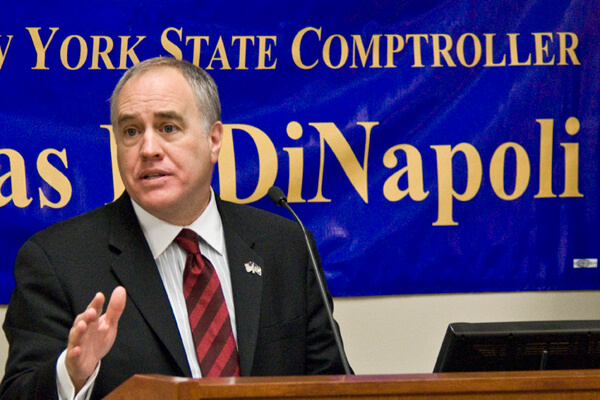It was in the late winter of 2004 when I met Edie Windsor and the woman she would marry several years later in Toronto, Thea Spyer. A couple of weeks before, Gavin Newsom, then mayor of San Francisco, declared that city had the authority to marry same-sex couples.
Relying on a legal argument that nothing in New York State law forbade marriage by gay and lesbian couples, activists planned a demonstration outside the City Clerk’s Office, then across the street from City Hall, demanding that same-sex marriage licenses be issued here as well. When a crowd got together at the LGBT Community Center a few evenings before the demo to strategize and make signs, Edie and Thea were among them –– certainly the oldest couple on hand.
The demonstration had no immediate effect on the right to marry here in New York, and Newsom’s experiment in San Francisco was soon halted. The following year, marriage equality advocates won a trial court victory in Manhattan, but that was quickly appealed by Mayor Michael Bloomberg and Attorney General Eliot Spitzer. We lost at the Court of Appeals in the summer of 2006.
When I met Edie and Thea, they were well into their 70s and Thea had suffered for decades from multiple sclerosis. By 2007, she was quite ill, and with marriage equality available only in Massachusetts –– and there still only for in-state couples –– the two women feared they would not see the day they could wed. With the help of the New York grassroots activist group Civil Marriage Trail –– and six friends who helped handle Thea’s wheelchair at the airport –– the couple traveled to Toronto to marry. The following year, a state appellate court here ruled that marriages like Edie and Thea’s deserved recognition in New York.
Thea died in 2009, but even though the women enjoyed two years of married life among their more than four decades together, the federal government judged them to be legal strangers. Edie received an inheritance tax bill of more than $360,000.
Edie, who is now 84, has spent more than two years litigating DOMA, an endurance test she described as “joyous, just joyous.” I have run into her at more fundraisers, political events, and community gatherings in the past several years than I can count. She is energetic, passionate, opinionated, irreverent, and articulate –– in short, a consummate New Yorker. It should be a point of pride for all LGBT New Yorkers that we have Edie and that it was she who won this smashing victory on behalf of gay and lesbian couples across the nation.
As each successive victory at the Supreme Court has done, Justice Anthony Kennedy’s finding –– that DOMA “is invalid, for no legitimate purpose overcomes the purpose and effect to disparage and injure those whom the State, by its marriage laws, sought to protect in personhood and dignity” –– advances our ability to mount successful legal claims for full equality.
As Arthur S. Leonard points out on page 10, Kennedy did not take the bigger step we hoped he might and find that claims of sexual orientation discrimination must be subjected to “heightened scrutiny” by the courts. Such a decision would have accelerated dramatically the vital work of clearing away the underbrush of homophobic marriage restrictions still in place in roughly three-dozen states. His opinion appears, at first blush, to finesse that pressing legal question.
Similarly, the court’s decision to deny standing to those appealing a lower court decision striking down Prop 8 put off for the moment the effort to litigate the fundamental question of whether same-sex couples have a federal constitutional right to same-sex marriage.
Those caveats aside, June 26, 2013 is every bit as good a day as June 26, 2003, when the high court struck down the nation’s remaining sodomy laws. Today added two very significant victories and did nothing to foreclose continued efforts to press for marriage rights, both in state courts around the country and before the federal judiciary.
The sweep of our victories, in fact, should humble us, given the continued adversity that remains on other fronts. Five days before the news came down from the Supreme Court, the update out of Albany was depressingly familiar. The State Senate finished up its regular 2013 session without allowing a vote on a basic transgender civil rights law, the Gender Expression Non-Discrimination Act, which has now won approval in the Assembly six times.
The Senate leadership –– a partnership between the minority Republicans and four Democrats who bolted their party to form the Independent Democratic Conference (IDC) –– bears primary responsibility for the failure to get the job done on GENDA. There is little doubt the bill would pass if given a vote. The IDC’s members, all of whom support the civil rights measure, justified their betrayal of party on the argument they could marry progressive action to a Senate leadership regime not mired in the dysfunction that plagued the Democrats when they last led the chamber in 2009 and 2010.
On issues from women’s equality to campaign finance reform to GENDA, the IDC failed miserably. As I wrote in our last issue, Governor Andrew Cuomo also missed an opportunity to show the sort of leadership on GENDA that he so brilliantly exhibited on marriage equality two years ago. The transgender community is a small portion of the overall LGBT population –– and so the political dividends from action may seem modest –– but it is also a marginalized and vulnerable community in dire need of basic legal protections. Getting the job done cannot wait for another election cycle. Next year, if not earlier, must be the deadline on delivering on the promise of equality for transgender New Yorkers.
Also overdue are basic employment protections for LGBT Americans nationwide. More than half the states provide no protections against private sector workplace bias, based on either sexual orientation or gender identity and expression. The federal Employment Non-Discrimination Act (ENDA), pale a remedy as it is compared to efforts decades ago to enact sweeping civil rights law protections, remains a hostage to Republican intransigence in the House of Representatives.
Many advocates assumed President Barack Obama, once he got past his reelection fight, would issue a long-sought executive order barring employment discrimination by businesses with federal contracts. Eight months after the election, there is no sign the president is ready to move. Given the clear signal from the high court today as to where the nation is moving on LGBT rights, the president should seize the initiative with an executive order. The time is now.
Finally, this Pride Weekend as we celebrate hard-fought wins, we should be mindful that the very same Supreme Court whose marriage decisions we rejoice in stripped the federal Voting Rights Act of its teeth in a decision that imperils decades of progress on equal access to the ballot and to representation. LGBT people of color are among the millions whose basic right to vote is now at risk. And we should never forget that the political forces who are trying to curb the rights of African Americans, Latinos, and other ethnic communities are no friends to LGBT communities of whatever color.

































